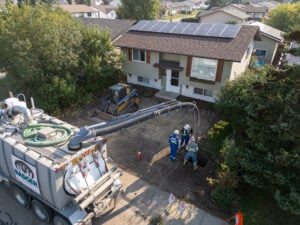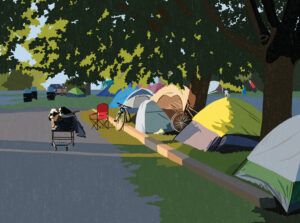
People & Culture
Kahkiihtwaam ee-pee-kiiweehtataahk: Bringing it back home again
The story of how a critically endangered Indigenous language can be saved
- 6310 words
- 26 minutes
This article is over 5 years old and may contain outdated information.
People & Culture

Route Blanche is one of seven expeditions that have received funding from The Royal Canadian Geographical Society in 2016. For one month this winter, Dave and Adrien Greene snowshoed 418 kilometres along Quebec’s Lower North Shore using traditional winter camping methods and connecting students from across Canada with the remote communities along the so-called Route Blanche. Here, they reflect on their journey.
Watch the CanGeo blog and follow the RCGS on Twitter for updates from all of this year’s exciting expeditions.
They say that dogs are a reflection of their owners. Osa seems to be as confused as we are as she carefully circles again and again on the lonely remaining patch of snow in our yard. As she curls up, her tail falls off the snow and into the surrounding mud. She appears to be thoroughly disheartened, suffering from the post-trip blues as she suddenly finds herself shedding, covered in muck and unhappy with the relative heat wave.
The only visible trace of our expedition is four sleeping bags and a canvas tent hung out on the line for a much-deserved airing in the warm spring sun. If it weren’t for our photos and grubby journal, we might forget we went anywhere at all. With every expedition, we come to expect, and eventually accept, this phase of the journey. The adventure is over, bills are waiting to be paid and life marches on.
The distance between us and The Lower North Shore has grown in far more than kilometres. We are another world away, one that operates on a different time frame and rhythm. We awake to brown fields and muddy paths. Two weeks ago, we were surrounded by pristine, white snow and a glittering icy landscape begging to be explored. From the very first day of our expedition we asked ourselves when we could return to venture even further into the beckoning hills around us.
We weathered cold fingers, the unrelenting wind, improbable rain, broken gear, fatigue and of course, fear. In a region that is always beautiful, but never forgiving, these experiences are nothing more than par for the course. With good health, strength and our meticulous preparations we were able to endure the challenges and happily absorb the kindness of strangers and learn so much about a place that few Canadians have gone to.
The scenery spoke for itself. So did the people. We found ourselves traversing one of the most interesting and alluring places we could have imagined and learned more than we ever could have hoped.

Through countless conversations along the Route Blanche we were thrust simultaneously into the past, present and future of the Lower North Shore. We were regaled with stories of sealing, fishing, shrinking communities, growing concerns of the fate of the coast and the way things used to be.
Quickly, the line between past and present became blurry. The man who grew up travelling by dog team, now expertly fixes snowmobiles. The woman who bakes all of her family’s bread also buckles passengers into the local helicopter. Brand new snowmobiles, driven by beaver skin-clad hands, have old time bear paw snowshoes strapped on the back.
We lost track of ourselves in the landscape, the year and date falling away as meaningless details. While plodding along, wearing homemade canvas parkas or lighting the woodstove in our tent, it could have been any decade. In the quiet evening our satellite communicator would alert us to incoming messages from students as far away as Toronto, catapulting us back into 2016.
Old and new rubbed elbows on the Lower North Shore quite amicably. In a place so harsh and rugged, there is no time or spare energy to debate conveniences. If something works, use it. If something doesn’t, lose it. Our very style of travel matched the credo of the region; the tried and true from the past working side by side with the best of the present.
For a brief 28 days we were honoured to be a part of the Coast, wending our way along routes used for generations, experiencing the hardship and sense of reverence that the land imparts on visitors and residents alike. It is the very landscape and fascinating history that make the Lower North Shore such a unique and special part of Canada.
Those who are born in the region know it is one of the most beautiful places in the country. Those of us fortunate to visit will forever hope to return.
Related: Route Blanche expedition encounters cold weather, warm reception in Quebec
Are you passionate about Canadian geography?
You can support Canadian Geographic in 3 ways:

People & Culture
The story of how a critically endangered Indigenous language can be saved

People & Culture
The Home Improvement Challenge ran concurrently around all other themed challenges and had the potential to have the greatest effect on household emissions

People & Culture
For unhoused residents and those who help them, the pandemic was another wave in a rising tide of challenges

People & Culture
The death of an unhoused Innu man inspired an innovative and compassionate street outreach during the nightly curfew in 2021